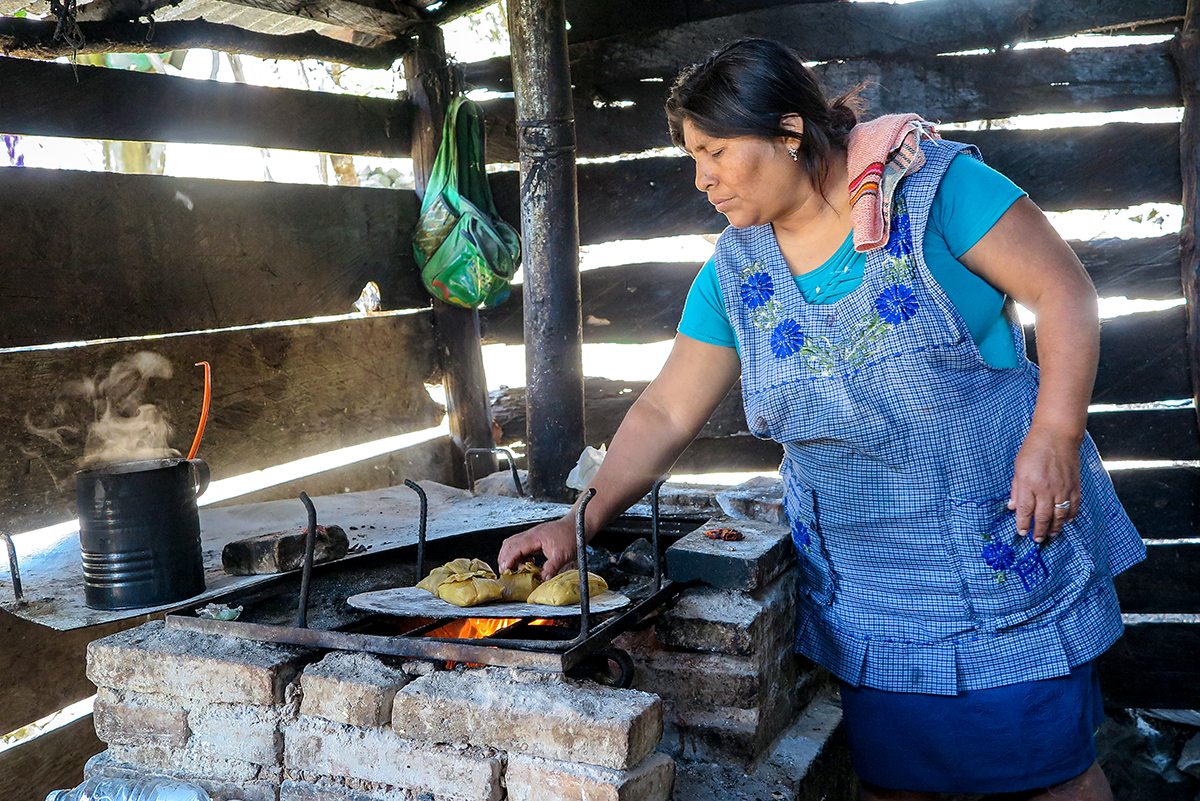
Marissa Revilla, GPJ Mexico
Silvia Jiménez Pérez, a member of Mujeres y Maíz, a group of women who produce tortillas and other corn-based products, prepares food in her work space.
TEOPISCA, MEXICO — By the time the first rays of sunlight cross the sky, Silvia Jiménez Pérez is already boiling corn kernels that are the key ingredient of the food she’ll sell in San Cristóbal de Las Casas, the cultural capital of Chiapas state.
“I make tamales, taquitos, memelitas, pozol and everything that occurs to me out of corn,” she says. “That’s my business.”
Jiménez Pérez, 44, grows all the corn she uses.
“I like to go out to harvest. There’s no happier time than when the rains begin,” she says. “In May the rain officially begins, and in June or July you start finding vegetables in the fields, amaranth, leafy greens, squash flower, one small vegetable or another. None of them are planted or cultivated or have chemicals – they’re all natural.”
Corn is the staple food of Mexico and the base of many iconic Mexican foods, including tortillas, tamales and other dishes, but corn production overall in the country has slowed while imports of the crop have grown. The U.S. exported $2.6 billion worth of the crop to Mexico in 2016, but roller-coaster statements from U.S. President Donald Trump on whether he’ll seek to end the North American Free Trade Agreement (NAFTA) — the trade deal that allows tariff-free imports and exports between Canada, the U.S. and Mexico — has Mexican lawmakers concerned about the country’s future corn supply. The availability of cheap imported corn under NAFTA pushed many small farms out of the market, leaving Mexico vulnerable if the U.S. stops or even slows its exports.



Jiménez Pérez and people like her could play an increasingly important role as uncertainties loom over the globalized food economy.
She is a member of Mujeres y Maíz, through which indigenous and mestiza women in Chiapas get support to grow corn and make their own corn products. The cooperative formed in 2008 and now has 180 members who are working together to build a community center, where they’ll train others in their skills and sell some of their products.
The women have seen politics impact their food supply before. The group formed just before a crisis known in Mexico as “tortillazo,” says Luz del Carmen Silva Pérez, a member of Capacitación, Asesoría, Medio Ambiente y Defensa del Derecho a la Salud, an environmental and health resources organization that supports Mujeres y Maíz.
The word tortillazo is often used to describe political or economic situations that send the price of tortillas up. Early this year, price hikes at the gas pump were referred to as “gasolinazo,” which also resulted in a tortillazo.
In the early 2000s, the U.S. shifted much of its corn crop to biofuels, so Mexican companies hoarded their own crop for fear that there wouldn’t be enough to supply the tortilla industry. Prices skyrocketed.
“The kilo of industrial tortillas went from 5 pesos to 12 or 14 pesos,” Silva Pérez says.
But small-scale tortilla makers couldn’t raise their prices much and still expect to get any business, so they stocked up on local corn.
Esperanza Bautista, the 32-year-old corn farmer who founded Mujeres y Maíz, says the group’s first task was to provide local corn, including some from family plots, to local women who make tortillas and tostadas in San Cristóbal de las Casas.
From there, the group noticed other common challenges. Most local tortilla makers cooked on open ovens that gulped up great quantities of wood and generated smoke that made the women and their families sick. So Mujeres y Maíz began to build energy-saving stoves.
For Carmela María Ruíz Belo, the promise of an energy-saving stove drew her to Mujeres y Maíz. She was invited in 2016 by a neighbor to join the group for work and community. Now, she uses a stove that has a griddle so she can cook more than one thing at a time, and all the smoke is funneled through a chimney. She also attends workshops on healthy eating and helps plant trees locally.
These are small efforts when compared with Mexico’s national economy and food supply chain, but they are key in boosting food sovereignty for people who need it most, experts say.
“Food sovereignty isn’t only a question of rights, but you’re also talking about questioning the food system itself, so you’re talking about many dimensions,” says Helda Morales, a researcher in the agroecology department of Colegio de la Frontera Sur, a public science investigation center that focuses on sustainable development along Mexico’s southern border.



Mujeres y Maíz is one of many groups making similar efforts across Mexico. Those groups are working to create a network, even if only for sharing knowledge. Some of the Mujeres y Maíz members attended a meeting in Italy to learn about the global slow food movement, which promotes local production and consumption.
“This is how changes can be generated,” says Luz del Carmen Silva Pérez, a member of Capacitación Asesoría Medio Ambiente y Defensa del Derecho a la Salud, an environmental and health resources organization that supports the Mujeres y Maíz.
“We are small granites, small nodes distributed in many parts of the country, in many parts of the world,” she says. “We dream of strengthening food sovereignty and in that sense, belonging to these networks makes us strong.”
Danielle Mackey, GPJ, translated this story from Spanish.







